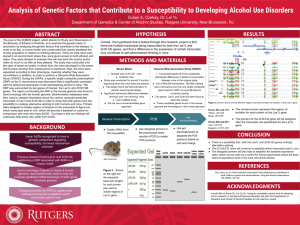Czekay, Susan: Analysis of Genetic Factors that Contribute to a Susceptibility to Developing Alcohol Use Disorders
Title: Analysis of Genetic Factors that Contribute to a Susceptibility to Developing Alcohol Use Disorders
Name: Susan Czekay
Major: Biological Sciences
School affiliation: Douglass Residential College, School of Arts and Sciences
Programs: Honors in Biology
Other contributors: Lei Yu
Abstract: The goal of the SOBER project, which stands for the Study and Observation of the Behavior of Ethanol in Rodents, is to examine the genetic basis of alcoholism by analyzing the genetic factors that contribute to the disease. In order to do this, a mouse model was constructed that closely paralleled the human population in relation to drinking behavior. Thirty-six male mice were placed in an environment where they were given access to both ethanol and water. They were allowed to exercise free will and drink the alcohol and/or water as much or as little as they pleased. The study was conducted over the span of about six weeks, in which time, the mice developed to the extent that humans develop from adolescence to adulthood. Next, the mice were separated according to their phenotype, meaning whether they were non-drinkers or drinkers, in order to perform a Genome-Wide Association Study (GWAS). During the GWAS, a specific single nucleotide polymorphism (SNP) on the X chromosome was discovered that is significantly correlated with the behavioral phenotype of self-administering alcohol in mice. The SNP was surrounded by two genes of interest, the Las1L and ZC3H12B genes. The region surrounding the SNP in the mouse genome was found to have homology with the human genome. Bioinformatics databases were then used to compile information about the various computer-predicted transcripts of Las1l and Zc3h12b in order to show that both genes have the possibility to undergo alternative splicing in both humans and mice. Primers were designed to isolate regions of interest on the transcripts to figure out which transcripts exist in vivo, which will provide a baseline or control for comparison with mice who have AUDS. Our hope is that our findings will eventually help those who suffer from AUDs.
